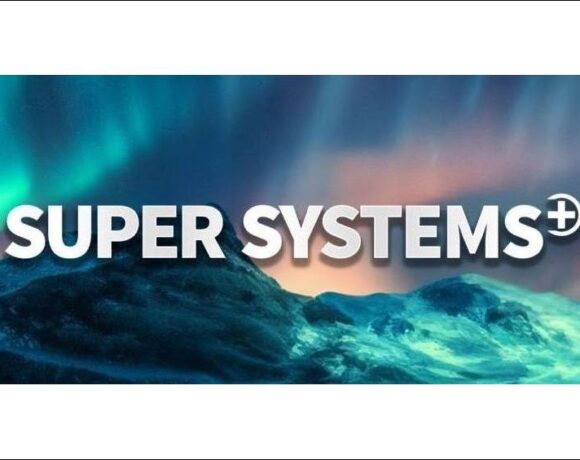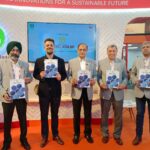ITAMMA Seminar On Technical Textiles Capital Goods Sector
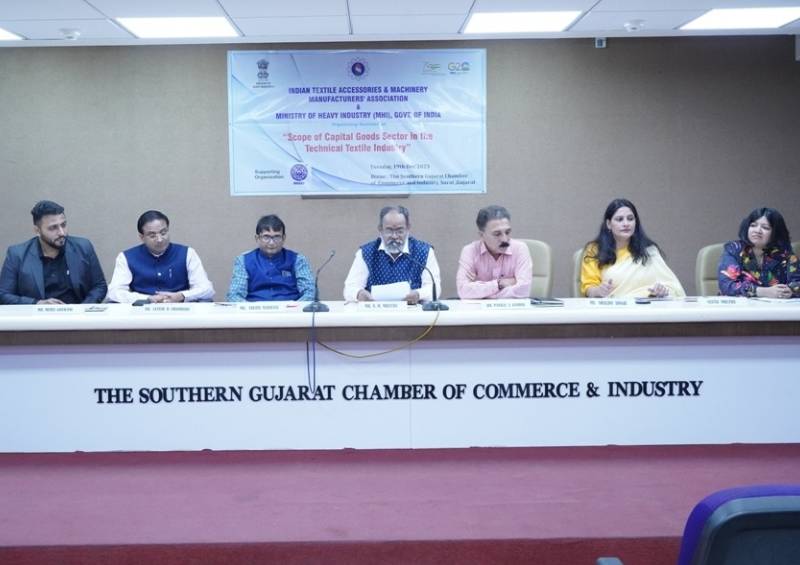
ITAMMA held a seminar in Surat on ‘Scope of Capital Goods Sector in the Technical Textile Industry’ at the SGCCI Hall in Surat
The Surat seminar was joinly organised with support of the Southern Gujarat Chamber of Commerce and Industry (SGCCI)
ITAMMA is taking forward the events for the development of textile capital goods sector with the support of Ministry of Heavy Industry and has held several such seminars in recent months.
In his address, Nikhil Madrasi, Secretary, SGCCI exemplified the essence of adaptability and the imperative nature of embracing change.
Drawing examples of iconic brands like Nokia, Motorola, and Hamam, he underscored the fundamental truth that change is not just a necessity but the cornerstone of progress.
He shared an anecdote about his own textile business, where the reluctance to adopt technologies like jacquard resulted in its eventual closure, highlighting the critical importance of adopting latest technologies.
Nikhil Madrasi also spoke on burgeoning domain of technical textiles, whose applications include several sectors like automobiles, sports, medicine, safety, construction and many other industries.
He projected the global technical textiles market to reach a staggering $43 billion by 2024-25, with India poised to grow at an impressive rate of 8 percent, surpassing the global average of 4 percent.
Dr Pankaj Gandhi, Director, Man Made Textiles Research Association (MANTRA) began his address by tracing the origins of textiles, shedding light on their evolution fostered by cultural exchanges.
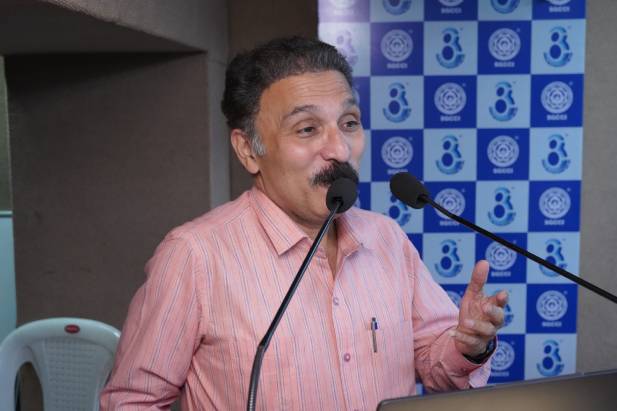
Presentation by Dr. Pankaj J Gandhi, Director, Man Made Textiles Research Association (MANTRA) on “Initiatives taken at MANTRA in the Capital Goods Sector for the Development of Technical Textiles,
In a succinct yet enlightening manner, he demystified the concept of capital goods. Further, he delved into the intricacies of jacquard designs and punch card technology.
He did so by vividly illustrating their impact through the narrative of a Surat-based weaver who designed an iconic image of a queen, now housed in a London Museum.
Highlighting the enterprising spirit of Gujarat, Dr. Gandhi exemplified this by recounting the story of a company specialising in the manufacturing of ink used in printing US dollars.
Simplifying the nuances of technical textiles, he shared instances, such as Usain Bolt’s use of sports tech garments that aided his remarkable sprinting achievements by minimising wind-induced friction.
Linking technical textiles to economic growth, Dr Gandhi underscored the potential for bolstering the country’s GDP by manufacturing machinery essential for the sector, aligning with Make in India initiative.
Dr Gandhi also elaborated on MANTRA and its initiatives and collaborations like conducting a comprehensive survey of dyeing and printing houses over five years.
This was done in partnership with Sardar Vallabhbhai National Institute of Technology (SVNIT), to understand energy inefficiencies.
According to Dr Gandhi, this survey led to development and patenting of a new stenter machine, available at a fraction of cost of its German counterpart, through energy modelling and benchmarking.
He spoke about collaborating with the Aditya Birla Group to pioneer innovative face wipes and also working alongside the Ministry of Power to develop an Air Flow Dyeing Machine that minimises water usage.
Dr Latesh Chaudhari, Principal, RNG Patel Institute of Technology (RNGPIT) began his address by invoking the wisdom of former President Dr APJ Abdul Kalam.
“Dr Kalam had emphasised the transformative power of learning and its pivotal role in fostering creativity, critical thinking, and the acquisition of knowledge,” Dr Chaudhari said.
He underscored RNGPIT’s steadfast commitment to advancing technical textiles within the capital goods sector, elucidating the institute and its proactive initiatives.
These initiatives encompass a multifaceted approach, including the development of essential skills identified by the National Skill Development Corporation (NSDC).
Moreover, RNGPIT has set up a dedicated research and vocational centres, in collaboration with Ministry of Heavy Industries (MHI) to pioneer creation of a Common Engineering Facility Centre (CEFC).
Shalini Singh, Chief Operating Officer and Acting CEO, Capital Goods & Strategic Skill Council, New Delhi highlighted pivotal initiatives driving the transformation of the entire manufacturing sector.
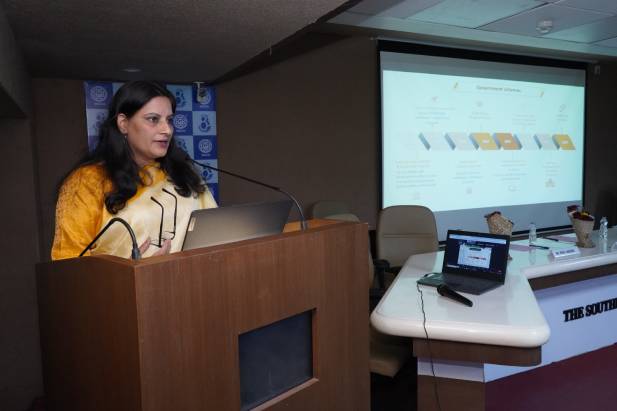
Presentation by Shalini Singh, Chief Operating Officer and Acting CEO “Opportunities in Re-Skilling/Up-Skilling for the Development of Capital Goods Sector of Textile Industry
She emphasised on a paradigm shift, where the focal point has transitioned from pursuing degrees to recognising the paramount importance of skill development.
Singh underscored that India’s vision of achieving ‘Make in India’ initiative and attaining global competitiveness, hinges crucially on addressing the dearth of skilled manpower.
Singh also underscored the significance of the new education policy, which allows workers to formalise their education through online blended learning programs.
“The overarching objective is to empower individuals with opportunities through skill enhancement, training, and various CGSSC initiatives, by bridging gap between industry needs and skilled manpower,” she added.
ND Mhatre, Director General (Tech), ITAMMA in his presentation gave details of MHI Schemes for the benefit and development of textile capital goods sector.
He specifically emphasised on machines and components needed to be developed for the production of technical textiles, as Surat is hub of manmade textiles and as the major raw material for technical textiles is MMF.
According to MD Mhatre, the Surat industry is well acquainted with the operation and functioning of manmade fibre textiles so it will be easy for them to switch to manufacturing of technical textiles.
The next speaker was Mehul Goswami, Director, Sambuq.com who is developing ‘Smart Data Clinic’, a proposed value-added platform on ITAMMA’s Business Enabler Website.
He delved into cutting-edge marketing strategies and digital tools tailored to bolster the capital goods sector.
He emphasised on the ITAMMA Business Enabler Platform and highlighted its capacity to provide significant assets to ITAMMA members.
He also shared forthcoming plans aimed at augmenting the role of platform in fostering knowledge and business development within the textile engineering and manufacturing Industries.
Neetii M, Director, Mercury Web addressed on the various applications of digital tools and its benefits to ITAMMA Members and the textile community.
She spoke about harnessing the potential of social media to amplify business prospects and effectively market products and services.
Neeti underscored the transformative power of social media as a potent instrument for global outreach, brand establishment, precise marketing strategies, and fostering community engagement.
She highlighted its pivotal role in enabling businesses within the capital goods sector to broaden their reach and maintain a competitive edge in the market.
Hasmukhbhai Shah, a mentor of textile industry was felicitated for his yeomen services, especially to the student’s community within the textile industry.
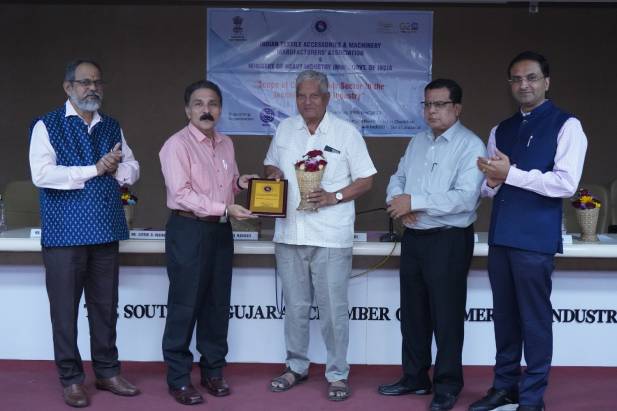
Hasmukhbhai Shah, Mentor of Textile Industry was felicitated for his Yeomen services to the Textile Industry and especially to the students community of Textile Industry




